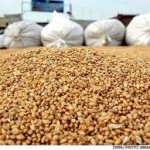By Souhail Karam
 RABAT, Sept 27 (Reuters) – Cash-strapped Morocco on Thursday announced a rare cut in a subsidy it pays millers for imported soft wheat in a new sign authorities are discreetly testing the waters as they gradually reform a costly subsidy system.
RABAT, Sept 27 (Reuters) – Cash-strapped Morocco on Thursday announced a rare cut in a subsidy it pays millers for imported soft wheat in a new sign authorities are discreetly testing the waters as they gradually reform a costly subsidy system.
The move may pit industry operators and authorities on whether the 15 percent reduction in the subsidy would mean raising the price of bread, a sensitive issue in the north African country, where protests over unemployment and poverty are common.
It may also cool local industry operators appetite for imports, after authorities announced last week the suspension of custom duties on soft wheat imports during the fourth quarter to ensure regular supplies to the domestic market.
Instead of 100 percent, the government will pay 85 percent of any excess between its reference 2,600 dirhams ($300) price for soft wheat and the price of soft wheat imported between Oct 1 and end-December, state grains authority ONICL said in a circular published on its website.
Morocco’s fiscal and current account deficits surged last year to their highest levels in many years and analysts are worried about Rabat’s ability to quickly reverse the trend.
Authorities have promised to start reducing spending on subsidies, costs of which amounted to roughly the budget deficit last year, but indicated the process may take until 2016.
Subsidies for soft wheat however amounted in 2011 to less than 7 percent the total subsidy spending.
“Who will pay the deducted 15 percent? Santa Claus?” fumed this Casablanca-based trader. “Millers are the targets of this measure and it will not take them too long to cry foul and threaten of raising bread prices,” he added.
The circular specified that the subsidy reduction was limited to the fourth quarter of this year. Government officials could not be reached to establish whether this step falls under the ongoing subsidy reform.
Bad weather slashed Morocco’s soft wheat harvest to 2.74 million tonnes from 4.1 million tonnes a year earlier. Based on demand of 7.1 million tonnes last year, Morocco will need to import in excess of 4.3 million tonnes of soft wheat to fill the shortfall, excluding stock variations.
The rise in import needs comes at a bad time for the $95 billion economy whose fortunes are closely tied to the euro zone. The debt turmoil there has hit Morocco’s tourism revenues, remittances from workers abroad and foreign investments this year, reducing hard currency reserves to barely four months of import needs, their lowest in a decade.
Rabat, whose dirham currency is not fully convertible, sought in August help from the International Monetary Fund (IMF) which granted it a $6-billion-plus liquidity line to draw on in need, which represents two months of import needs.
The agriculture ministry said soft wheat stocks should stand at 1.3 million tonnes by end-September, which — considering monthly milling needs of 400,000-450,000 tonnes — can cover three months of national needs.
“Soft wheat is available although the stocks have been declining one month after another,” said a Casablanca-based miller. “The problem lies in stocks of national subsidized flour which are currently low, very low,” he added.
Earlier this year, the state’s National Competetiveness Council said the subsidy system for wheat was ruled by an “overly complex legal framework, gives rise to rentier and fraudulent situations, poorly target-oriented and gives little visibility for imports”.
($1 = 8.6449 Moroccan dirhams) (Reporting by Souhail Karam; Editing by Anthony Barker and Leslie Gevirtz)
.







